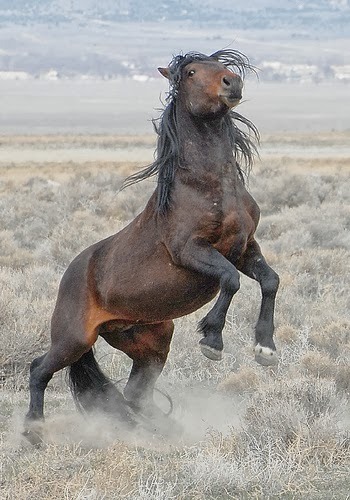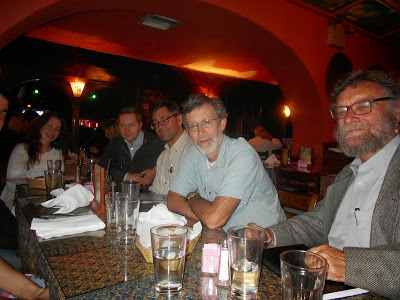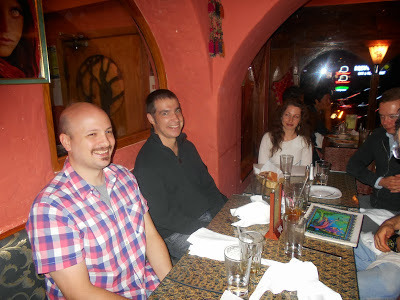Michael Swanwick's Blog, page 162
October 7, 2013
Michael Swanwick, Trencherman
.

And now for something completely different . . . a link to somebody else's blog!
Lawrence M. Schoen has a series on his blog titled Eating Authors . As he explained it to me:
Lawrence is a genial guy and I like him, so I said yes. And I told him about the time that I -- moderate and abstemious man though I am -- was a Trencherman for a Night.
Click here to read the entire story.
And as always . . .
I'm on the road again. Today it's a flying visit to New York City for the SFWA Annual Reception for Industry Professionals, an ungainly name for a pleasant event that's pretty much universally referred to as the Mill-n-Swill. (I don't know who came up with that nickname, but I'm pretty sure it was an editor; and I think I can guess which publishing house; and I know which one I'd bet twenty bucks it was.)
I'll be back Wednesday, possibly with tales of lust and fury among the glitterati. But probably not. It's been decades since Thomas Disch got drunk at a SFWA event and took a swing at . . . Oh, wait, the other guy is still around. I'm afraid you'll have to wait to hear that story.
Above: I've said it many times before, but it bears repeating. Lee Moyer is a brilliant and witty artist. Any time one of my publishers wants to commission him to do another cover for me, they'll have my full support.
*

And now for something completely different . . . a link to somebody else's blog!
Lawrence M. Schoen has a series on his blog titled Eating Authors . As he explained it to me:
Given that the protagonist of much of my fiction styles himself a gourmand, a couple years ago I started a feature on my blog where I ask other authors to share recollections of their most memorable meal.
Lawrence is a genial guy and I like him, so I said yes. And I told him about the time that I -- moderate and abstemious man though I am -- was a Trencherman for a Night.
Click here to read the entire story.
And as always . . .
I'm on the road again. Today it's a flying visit to New York City for the SFWA Annual Reception for Industry Professionals, an ungainly name for a pleasant event that's pretty much universally referred to as the Mill-n-Swill. (I don't know who came up with that nickname, but I'm pretty sure it was an editor; and I think I can guess which publishing house; and I know which one I'd bet twenty bucks it was.)
I'll be back Wednesday, possibly with tales of lust and fury among the glitterati. But probably not. It's been decades since Thomas Disch got drunk at a SFWA event and took a swing at . . . Oh, wait, the other guy is still around. I'm afraid you'll have to wait to hear that story.
Above: I've said it many times before, but it bears repeating. Lee Moyer is a brilliant and witty artist. Any time one of my publishers wants to commission him to do another cover for me, they'll have my full support.
*
Published on October 07, 2013 06:15
October 4, 2013
K3LOID
.
Okay, it's Friday and my computer is barely speaking to the tubes and chutes of the Interweb, so I'm posting a video trailer for K3LOID , a short film by Big Lazy Robot about a robot uprising. It looks to be great fun.
The robot uprising seems to be the default meme for robots. The very first appearance of robots (well, actually artificial humans, which would make them androids; but this is where the word was invented; and anyway that fight has been long lost) in R. U. R. by Karel Capek featured a robot rebellion, and almost a century later we're still playing out the same fantasy.
Robots were a mainstay of science fiction from their initial speculative invention, continued strong through the1970s and then dwindled to almost nothing in the 1980s as various pundits articulated the many irrefutable reasons why there would never be humanoid robots. Followed in the 1990s by a swarm of Japanese patents for humanoid-ish robots that could do the many things it had just been established they never would.
You don't see a lot of written science fiction about robots nowadays (film robots are a different story), I suspect mostly because so many of them already exist. But I think they're going to make a comeback. All that's needed is one major story with an original and compelling vision of what robots might become.
New writers should take note.
*
Okay, it's Friday and my computer is barely speaking to the tubes and chutes of the Interweb, so I'm posting a video trailer for K3LOID , a short film by Big Lazy Robot about a robot uprising. It looks to be great fun.
The robot uprising seems to be the default meme for robots. The very first appearance of robots (well, actually artificial humans, which would make them androids; but this is where the word was invented; and anyway that fight has been long lost) in R. U. R. by Karel Capek featured a robot rebellion, and almost a century later we're still playing out the same fantasy.
Robots were a mainstay of science fiction from their initial speculative invention, continued strong through the1970s and then dwindled to almost nothing in the 1980s as various pundits articulated the many irrefutable reasons why there would never be humanoid robots. Followed in the 1990s by a swarm of Japanese patents for humanoid-ish robots that could do the many things it had just been established they never would.
You don't see a lot of written science fiction about robots nowadays (film robots are a different story), I suspect mostly because so many of them already exist. But I think they're going to make a comeback. All that's needed is one major story with an original and compelling vision of what robots might become.
New writers should take note.
*
Published on October 04, 2013 07:30
October 2, 2013
The Imagination is a Horse . . .
.

In response to Monday's post about "Radiant Doors," perhaps my bleakest story (unless it's "The Dead" ... how do you quantify such things?), Mark Pontin posted the following request:
This is a perfectly reasonable thing to ask. Alas, the answer is anything but straightforward.
It's true that I've been writing a lot of what Graham Greene called "entertainments" lately. In addition to the works cited, there are also my Mongolian Wizard stories, the fourth of which will be appearing at Tor.com soon. These were inspired by Poul Anderson's Operation Werewolf and the Lord Darcy stories by Randall Garrett. and there are three more stories in various stages of completion on my hard drive. I imagine these would also be seen as a distraction.
Why have I been writing entertainments? I honestly don't know. The imagination is a horse. I've learned how to ride mine, but not how to tell it where to go. All I can do is hang on and hope for the best.
This does not mean that I won't be writing any serious stories. On the side of the bookshelf by my desk, I have post-it notes with the names of six novels and a dozen shorter works I hope to get to in the foreseeable future. They do include a new Darger & Surplus story. But also a major collaboration with Gardner Dozois, a long story about dissecting a giant intelligent alien worm, a story set on a cloud, a Christmas story, a fantasy I promised Marianne for Dragonstairs Press, a werewolf story...
Most of these stories are nothing like you'd imagine they would be. They are all worth writing. And some of them are very dark indeed. But which will get written when? And what new ideas will rise up from the primordial murk in the meantime? Your guess is as good as mine.
I'm only riding the beast. And so far as I can tell, he doesn't take requests.
*

In response to Monday's post about "Radiant Doors," perhaps my bleakest story (unless it's "The Dead" ... how do you quantify such things?), Mark Pontin posted the following request:
... But perhaps at some point you'll take a break from Darger & Surplus and dragons -- however profitable and entertained the audience for such fiction might be -- and take the chance to write more stories like 'Radiant Doors'?
This is a perfectly reasonable thing to ask. Alas, the answer is anything but straightforward.
It's true that I've been writing a lot of what Graham Greene called "entertainments" lately. In addition to the works cited, there are also my Mongolian Wizard stories, the fourth of which will be appearing at Tor.com soon. These were inspired by Poul Anderson's Operation Werewolf and the Lord Darcy stories by Randall Garrett. and there are three more stories in various stages of completion on my hard drive. I imagine these would also be seen as a distraction.
Why have I been writing entertainments? I honestly don't know. The imagination is a horse. I've learned how to ride mine, but not how to tell it where to go. All I can do is hang on and hope for the best.
This does not mean that I won't be writing any serious stories. On the side of the bookshelf by my desk, I have post-it notes with the names of six novels and a dozen shorter works I hope to get to in the foreseeable future. They do include a new Darger & Surplus story. But also a major collaboration with Gardner Dozois, a long story about dissecting a giant intelligent alien worm, a story set on a cloud, a Christmas story, a fantasy I promised Marianne for Dragonstairs Press, a werewolf story...
Most of these stories are nothing like you'd imagine they would be. They are all worth writing. And some of them are very dark indeed. But which will get written when? And what new ideas will rise up from the primordial murk in the meantime? Your guess is as good as mine.
I'm only riding the beast. And so far as I can tell, he doesn't take requests.
*
Published on October 02, 2013 00:00
September 30, 2013
"A Terrible Story"
.

Some time back, over on Facebook, a reader expressed herself rather vehemently about what "a terrible story" my own "Radiant Doors" was.
I was not offended, because I knew what she was saying: That it upset her to read. That it made her unhappy. That it told her horrific things she didn't want to know. That was indeed the kind of story it was. I know, I wrote it. And I can remember what a depressing moment it was when I got the idea for "Radiant Doors" and knew I was going to have to write it.
The story's premise is that one day radiant doors open in the air in countries around the world. Through those doors millions of refugees come pouring -- people who have been hideously and in some cases grotesquely abused.
They come from our future.
The story is seen through the eyes of a relief worker, a woman who has been driven to the edge by the horrific things she's seen and heard and the awareness that every day that future is twenty-four hours closer than it was the day before.
It is a story that goes beyond bleak. It is a story about the human capacity for evil.
Not long after the story was published, a former Clarion West student came to my house to drop off an invitation to his wedding. His fiance was a rabbi and at one point, she took my wife aside, said that she'd just read it, and then asked, "How can you sleep beside him, knowing he has those things inside his head?"
Marianne, God bless her, smiled and said, "Oh, they're not in his head anymore. They're in yours."
I waited some time before posting this, because I didn't want it to seem that I was trying to convince the reader to like the story. She came to it with an open mind and a writer can ask no more.
But her comment gave me the chance to answer a question that I know arises in many readers' minds: Why would you write about such terrible things?
Because they exist. Because the potential for them resides within all of us. Because refusing to look at them does not make them go away. Because periodically we must recognize all these hard truths.
I have no criticism of the reader who thought "Radiant Doors" was a terrible story. It was only her phrasing that was a frazz imprecise, and in a social medium that is very close to casual conversation, that's very easily understood.
"Radiant Doors" is not a terrible story. It's a very good story about terrible things.
*

Some time back, over on Facebook, a reader expressed herself rather vehemently about what "a terrible story" my own "Radiant Doors" was.
I was not offended, because I knew what she was saying: That it upset her to read. That it made her unhappy. That it told her horrific things she didn't want to know. That was indeed the kind of story it was. I know, I wrote it. And I can remember what a depressing moment it was when I got the idea for "Radiant Doors" and knew I was going to have to write it.
The story's premise is that one day radiant doors open in the air in countries around the world. Through those doors millions of refugees come pouring -- people who have been hideously and in some cases grotesquely abused.
They come from our future.
The story is seen through the eyes of a relief worker, a woman who has been driven to the edge by the horrific things she's seen and heard and the awareness that every day that future is twenty-four hours closer than it was the day before.
It is a story that goes beyond bleak. It is a story about the human capacity for evil.
Not long after the story was published, a former Clarion West student came to my house to drop off an invitation to his wedding. His fiance was a rabbi and at one point, she took my wife aside, said that she'd just read it, and then asked, "How can you sleep beside him, knowing he has those things inside his head?"
Marianne, God bless her, smiled and said, "Oh, they're not in his head anymore. They're in yours."
I waited some time before posting this, because I didn't want it to seem that I was trying to convince the reader to like the story. She came to it with an open mind and a writer can ask no more.
But her comment gave me the chance to answer a question that I know arises in many readers' minds: Why would you write about such terrible things?
Because they exist. Because the potential for them resides within all of us. Because refusing to look at them does not make them go away. Because periodically we must recognize all these hard truths.
I have no criticism of the reader who thought "Radiant Doors" was a terrible story. It was only her phrasing that was a frazz imprecise, and in a social medium that is very close to casual conversation, that's very easily understood.
"Radiant Doors" is not a terrible story. It's a very good story about terrible things.
*
Published on September 30, 2013 08:41
September 27, 2013
A Hard Question for Young Writers
.

Monday night I had dinner with (among other good people) Robert Reed. Unsurprisingly, we had some substantial conversation about literary matters. At one point, I started talking about new, young writers. Both people with only a few published books under their belt and those who aren't yet published but will be eventually, I mean.
I told Bob that I'd had many discussions with these folks about their plans to self-publish their ways to glory, about all the work they put into building a brand, creating a community of followers (or readers, for those already published), making blog tours, hiring editors and illustrators, and so on and on and on. My point was that they were putting ferocious amounts of energy into non-writing activities without having first made up a business plan. One that would define success and map out how many hours per week would go into each activity and how long they could expect to be holding down four jobs (writer, self-publisher, self-publicist, and whatever puts food on the table) before they could support themselves writing.
But Bob interrupted me. "Do they ever talk about improving their craft?"
"Um . . . no."
"Then they're just wasting their time."
He was right, of course. The single most important a writer can be doing is improving his or her writing. Everything else is just . . . everything else.
Decades ago, when the Cyberpunk-Humanist Wars were in full swing and my generation was really tearing up the tracks, David Hartwell said to me, "You're competing with John Kessel and James Patrick Kelly and Bruce Sterling. But if you want to get anywhere, you've got to start competing with Gene Wolfe and Ursula K. Le Guin."
It was a shocking thing to hear. But it was something I needed to be told.
So if you're a new writer, here's the question you've got to ask yourself: Are you working as hard as you possibly can to make yourself a better writer?
Because if you're not, you're just wasting your time.
Above: The Saturnian ice moon Enceladus, with a major water-vapor plume, the result of as-yet undescribed cryovulcanism. Isn't that glorious? If you're going to be a science fiction writer, you also have to learn to do your research. But that's another rant for another day.
*

Monday night I had dinner with (among other good people) Robert Reed. Unsurprisingly, we had some substantial conversation about literary matters. At one point, I started talking about new, young writers. Both people with only a few published books under their belt and those who aren't yet published but will be eventually, I mean.
I told Bob that I'd had many discussions with these folks about their plans to self-publish their ways to glory, about all the work they put into building a brand, creating a community of followers (or readers, for those already published), making blog tours, hiring editors and illustrators, and so on and on and on. My point was that they were putting ferocious amounts of energy into non-writing activities without having first made up a business plan. One that would define success and map out how many hours per week would go into each activity and how long they could expect to be holding down four jobs (writer, self-publisher, self-publicist, and whatever puts food on the table) before they could support themselves writing.
But Bob interrupted me. "Do they ever talk about improving their craft?"
"Um . . . no."
"Then they're just wasting their time."
He was right, of course. The single most important a writer can be doing is improving his or her writing. Everything else is just . . . everything else.
Decades ago, when the Cyberpunk-Humanist Wars were in full swing and my generation was really tearing up the tracks, David Hartwell said to me, "You're competing with John Kessel and James Patrick Kelly and Bruce Sterling. But if you want to get anywhere, you've got to start competing with Gene Wolfe and Ursula K. Le Guin."
It was a shocking thing to hear. But it was something I needed to be told.
So if you're a new writer, here's the question you've got to ask yourself: Are you working as hard as you possibly can to make yourself a better writer?
Because if you're not, you're just wasting your time.
Above: The Saturnian ice moon Enceladus, with a major water-vapor plume, the result of as-yet undescribed cryovulcanism. Isn't that glorious? If you're going to be a science fiction writer, you also have to learn to do your research. But that's another rant for another day.
*
Published on September 27, 2013 00:30
September 25, 2013
This Glitterati Life
.

Monday night I drove into New York City for a dinner hosted by Gordon Van Gelder, owner/editor of The Magazine of Fantasy and Science Fiction , in honor of literary culture hero Robert Reed. Bob was in the Big Apple for the first time in twenty years and was struck by how greatly the city has improved itself since then.
Bob told me of his adventures in the gaming industry -- all positive, you'll be pleased to know -- and said that he'd been so busy that he'd written hardly any short fiction at all recently. "I've only sold six stories this year," he said.
I, in turn, very politely refrained from punching him out for that.
Above, from left to right: Alana Teitelbaum, Dmitry Iyudin, Gordon Van Gelder, Robert Reed, and Yours Truly.
Below, from left to right: Analog editor Trevor Quachri, John Armstrong, and Alana Teitelbaum again.
Not shown but present: Photographer to the Stars, Marianne Porter.
And on Friday . . .
Robert Reed and I talked some about new writers and he asked a question which they should find terrifying. I'll post that here, two days from now.

*

Monday night I drove into New York City for a dinner hosted by Gordon Van Gelder, owner/editor of The Magazine of Fantasy and Science Fiction , in honor of literary culture hero Robert Reed. Bob was in the Big Apple for the first time in twenty years and was struck by how greatly the city has improved itself since then.
Bob told me of his adventures in the gaming industry -- all positive, you'll be pleased to know -- and said that he'd been so busy that he'd written hardly any short fiction at all recently. "I've only sold six stories this year," he said.
I, in turn, very politely refrained from punching him out for that.
Above, from left to right: Alana Teitelbaum, Dmitry Iyudin, Gordon Van Gelder, Robert Reed, and Yours Truly.
Below, from left to right: Analog editor Trevor Quachri, John Armstrong, and Alana Teitelbaum again.
Not shown but present: Photographer to the Stars, Marianne Porter.
And on Friday . . .
Robert Reed and I talked some about new writers and he asked a question which they should find terrifying. I'll post that here, two days from now.

*
Published on September 25, 2013 10:13
September 23, 2013
Home Again, Home Again . . .
.

I returned home late last night from a week in a cottage in an obscure corner of Maine. There, above, is where I spent much of my time, out by the water under a tree inhabited by two ravens. Occasionally, a lobsterman would come by, empty his traps, and putter up the coast.
And what did I do? Pretty much nothing. I cleansed myself of electronica. When I was in the car, I left the radio off. I didn't even read newspapers.
I got a lot of reading done. And I only wrote one short essay in all the time I was there.
Mostly, when we travel, Marianne and I travel full-tilt boogie hard and fast: Up the mountains, into the caves, and a hundred miles down the road by noon. But every year I like to take a week off and bring myself to a full stop. On the first day, I'm so wired from a year of literary activity that I'm almost quivering. Slowly, I recover myself. And by the final day I no longer want to write.
That's when I know I can come home.
Today, I've done nothing at all, other than typing out and reworking the essay. In an hour, I leave for a literary dinner party in New York City. And tomorrow, rested and recharged, I'll resume my usual work schedule.
So I am content and so too, I hope, are you.
*

I returned home late last night from a week in a cottage in an obscure corner of Maine. There, above, is where I spent much of my time, out by the water under a tree inhabited by two ravens. Occasionally, a lobsterman would come by, empty his traps, and putter up the coast.
And what did I do? Pretty much nothing. I cleansed myself of electronica. When I was in the car, I left the radio off. I didn't even read newspapers.
I got a lot of reading done. And I only wrote one short essay in all the time I was there.
Mostly, when we travel, Marianne and I travel full-tilt boogie hard and fast: Up the mountains, into the caves, and a hundred miles down the road by noon. But every year I like to take a week off and bring myself to a full stop. On the first day, I'm so wired from a year of literary activity that I'm almost quivering. Slowly, I recover myself. And by the final day I no longer want to write.
That's when I know I can come home.
Today, I've done nothing at all, other than typing out and reworking the essay. In an hour, I leave for a literary dinner party in New York City. And tomorrow, rested and recharged, I'll resume my usual work schedule.
So I am content and so too, I hope, are you.
*
Published on September 23, 2013 11:02
September 11, 2013
And As Always . . .
.

My reading in NYC last night was very satisfying, very encouraging. I read the first chapter of my days-old novel Chasing the Phoenix, and it got laughter and applause. Which is all one can hope for.
Tomorrow, however, I hit the road again. This time I'm taking a vacation far from the Innertubes and Outerwebs. So it'll most likely be a week and a half before you hear from me again. I apologize for that. But I've been working extremely hard for the past several months and it's time at last for me to simply . . . not.
So enjoy September! I'll be back before it ends.
*

My reading in NYC last night was very satisfying, very encouraging. I read the first chapter of my days-old novel Chasing the Phoenix, and it got laughter and applause. Which is all one can hope for.
Tomorrow, however, I hit the road again. This time I'm taking a vacation far from the Innertubes and Outerwebs. So it'll most likely be a week and a half before you hear from me again. I apologize for that. But I've been working extremely hard for the past several months and it's time at last for me to simply . . . not.
So enjoy September! I'll be back before it ends.
*
Published on September 11, 2013 10:50
September 9, 2013
Chasing the Phoenix in New York CIty
.

Tomorrow I'm doing a New York Review of Science Fiction reading at the SoHo Gallery for Digital Art in New York City. Also reading will be the extraordinarily fine writer Richard Bowes. So this will be a great evening and everybody within striking distance of SoHo is urged to attend.
The basics are:
Because I finished my new novel Chasing the Phoenix yesterday, I'll be breaking with my usual practice and reading the first chapter instead of a story. But don't panic! The chapter takes the form of a stand-alone story with a beginning, middle, and an end. So you're not going to be left hanging.
Chasing the Phoenix is a Darger & Surplus book which takes sometime after the events in Dancing with Bears but is absolutely and without quibble a stand-alone novel. Between books, the two rogues passed through Siberia into Mongolia and down into China, which has broken down into many warring states. This voyage has changed one of them profoundly . . . but you'll have to show up at the reading to find out how.
There's a map, if you need one here. See you tomorrow!
*

Tomorrow I'm doing a New York Review of Science Fiction reading at the SoHo Gallery for Digital Art in New York City. Also reading will be the extraordinarily fine writer Richard Bowes. So this will be a great evening and everybody within striking distance of SoHo is urged to attend.
The basics are:
Tuesday, Sept 10th -- doors open 6:30 PM
$7 suggested donation
The SoHo Gallery for Digital Art
138 Sullivan Street (between Houston & Prince St.)
Because I finished my new novel Chasing the Phoenix yesterday, I'll be breaking with my usual practice and reading the first chapter instead of a story. But don't panic! The chapter takes the form of a stand-alone story with a beginning, middle, and an end. So you're not going to be left hanging.
Chasing the Phoenix is a Darger & Surplus book which takes sometime after the events in Dancing with Bears but is absolutely and without quibble a stand-alone novel. Between books, the two rogues passed through Siberia into Mongolia and down into China, which has broken down into many warring states. This voyage has changed one of them profoundly . . . but you'll have to show up at the reading to find out how.
There's a map, if you need one here. See you tomorrow!
*
Published on September 09, 2013 09:00
September 6, 2013
Disturbing Music Video Friday
.
I'm working hard. So hard, I almost didn't have time to post anything today. But I made the extra effort and here is . . . is . . .
The most disturbing music video I've seen in a long time. A tip of the Hatlo hat to Gregory Frost, fantasist extraordinaire, for pointing me toward it.
A word of warning, though. You don't want to watch this while eating spaghetti. It'll make you snort noodles out your nostrils.
*
I'm working hard. So hard, I almost didn't have time to post anything today. But I made the extra effort and here is . . . is . . .
The most disturbing music video I've seen in a long time. A tip of the Hatlo hat to Gregory Frost, fantasist extraordinaire, for pointing me toward it.
A word of warning, though. You don't want to watch this while eating spaghetti. It'll make you snort noodles out your nostrils.
*
Published on September 06, 2013 10:27
Michael Swanwick's Blog
- Michael Swanwick's profile
- 546 followers
Michael Swanwick isn't a Goodreads Author
(yet),
but they
do have a blog,
so here are some recent posts imported from
their feed.



